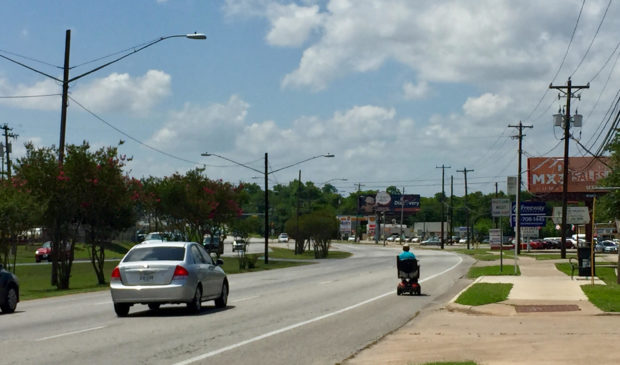Council positioned to delay corridor program decision
Thursday, March 22, 2018 by
Caleb Pritchard City Council appears all but certain to postpone a scheduled vote on Thursday on the draft Corridor Construction Program, the highly ambitious blueprint for spending an unprecedented amount of bond money in a particularly condensed time frame.
During Tuesday’s work session, several members expressed their desire to hold off on the decision, a sentiment that did not draw outward resistance from Mayor Steve Adler, the champion of the 2016 mobility bond that kicked off the drafting of the CCP.
The draft program itself is just one of a smorgasbord of bond-related items on Thursday’s agenda. The others include an amendment to expand the scope of services provided by the city’s engineering consultant firm HDR, approval of a staff-recommended set of design firms to partner with, advance funding agreements with the Texas Department of Transportation to work on sections of the corridors owned by the state, and the addition of five new staff members to help implement the CCP.
“Even with the current schedule, if Council were to approve this on Thursday, we are going to have to do some extraordinary things to try to meet our eight-year goal of implementation by 2024,” Corridor Program Office Director Mike Trimble told the handful of members who had stuck through to the final discussion of Tuesday’s eight-hour work session. “We are working on that, and we are committing to sticking to that, but right now we are trying to save days and weeks, and that’s why we’re bringing so many things to Council on the 22nd.”
Nonetheless, when Council Member Ann Kitchen asked whether it would be possible to delay a decision on just the draft CCP vote, Trimble told her it should present no problem.
“If we could move forward with the award of design contracts and move forward with the advance funding agreements, that allows us to at least continue to progress,” he said.
He went on to explain that the CCP will include $1.4 billion in projects sourced from existing studies of nine major corridors across the city. The 2016 bond only provided $482 million in funding, an amount that Council committed itself in a contract with the voters to spending within eight years of the election. Trimble said that other sources of funding, such as federal or state grants or public-private partnerships, would be explored to cover the remainder of the CCP.
In drafting the program, staff ran recommendations from the corridor studies through a complex matrix that scored projects based on metrics such as their cost, expected congestion relief, transit supportiveness and ability to improve safety.
Because of the limited resources, the draft CCP proposes to use 2016 bond money to largely repave the nine corridors, install new dedicated turn lanes, upgrade traffic signals, add sidewalks that are compliant with the Americans with Disabilities Act and paint new bike lanes, as well as add a smattering of transit priority treatments. Except for a large stretch along East Riverside Drive, more ambitious multimodal improvements such as protected bike lanes or dedicated bus lanes will have to wait for future funding sources.
Council Member Delia Garza said she has “significant concerns” about the scale of investments slated for William Cannon Drive, particularly in its Southeast Austin stretch where she said it has been “neglected” for years. She also questioned whether the proposed overhaul of East Riverside, which would include the preservation of right of way for future transit investments, would be premature given that Project Connect will likely produce its own recommendation for that corridor.
“We wouldn’t anticipate wasting money. What we would do is adjust our design for whatever is coming out of Project Connect, and that’s true for all of the corridors,” Trimble told her. He added that the design phase for the CCP projects will take one to three years, which he suggested would be enough time to adjust the draft recommendations Project Connect is expected to produce later this month.
Trimble also addressed Council Member Greg Casar’s questions about recommendations issued by the Bicycle Advisory Council, the Pedestrian Advisory Council and the Urban Transportation Commission. The BAC and PAC recently called for all corridor designs to include considerations for safer speed limits, while the UTC urged Council to beef up considerations for transit priority lanes. Trimble assured Casar that his team is interested in looking further at those recommendations, though Casar requested further clarity on those efforts sometime before any final vote on the CCP.
Kitchen also indicated her interest in delaying the vote in order to hear more specificity about how the planning is syncing up with Project Connect. Furthermore, she said she would vote against the CCP in its current form because of proposed bike lanes on a stretch of South Lamar Boulevard.
The draft plan calls for new lanes between Panther Trail and U.S. Highway 290, a particularly wide segment of the road that is inhospitable to any user not on a motorized vehicle.
“That’s not the segment that people are going to be riding their bikes on,” Kitchen said, noting that bike lanes there are not envisioned in the Bicycle Master Plan. “That funding is needed on other parts of Lamar, so we can have some conversations on that.”
Photo by Caleb Pritchard.
The Austin Monitor’s work is made possible by donations from the community. Though our reporting covers donors from time to time, we are careful to keep business and editorial efforts separate while maintaining transparency. A complete list of donors is available here, and our code of ethics is explained here.
You're a community leader
And we’re honored you look to us for serious, in-depth news. You know a strong community needs local and dedicated watchdog reporting. We’re here for you and that won’t change. Now will you take the powerful next step and support our nonprofit news organization?








